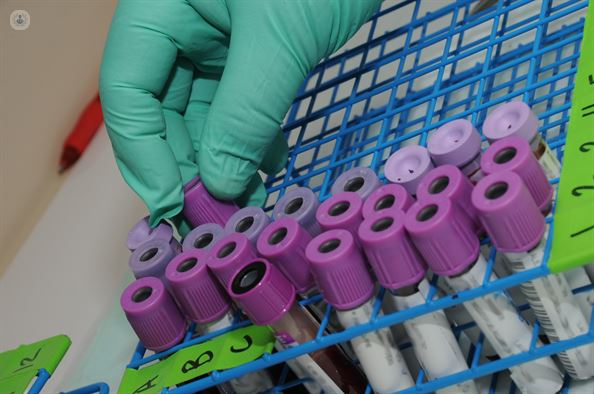

What is lymphoma?
Lymphoma is a group of blood cancers developing from lymphocytes, which are the cells that defend the body in the immune system. This proliferation takes place in the nodules or lymph nodes, although sometimes it also affects the spleen or liver. Thus, it is a cancer that originates in the lymphatic tissue.
As a result of the disease, there is an impairment of the immune system, which accentuates as the disease further spreads. If the bone marrow has been affected, it can lead to anaemia or other changes in the blood cells.
Lymphomas account for about 3-4% of all cancers around the world.
There are two main types of lymphoma:
- Hodgkin lymphoma or Hodgkin's disease
- Non-Hodgkin lymphomas
However, there is a new classification called the REAL System (Revised European American Lymphoma Classification), which divides types of lymphoma according to their clinical behaviour into three categories:
- Indolent lymphomas: are those that grow slowly. Patients with this type of lymphoma can live for many years without any treatment and without presenting the problems derived from the disease. In fact, in many of these patients treatment is discouraged if they do not develop symptoms.
- Aggressive or highly-aggressive lymphomas: these grow faster than the previously mentioned types. It is essential to treat patients with this type of lymphoma otherwise life expectancy is reduced to weeks or months. Luckily these are lymphomas that respond well to chemotherapy and many of them are curable.
What are the symptoms?
Normal lymphomas manifest through protruding lymph nodes, which increase in size and are visible in areas such as the neck, armpits or groins. However, when they appear in less accessible areas such as the abdomen or the mediastinum, they can go unnoticed thus making it difficult to diagnose until symptoms do not usually appear. These symptoms include, among others:
- Fever greater than 38 degrees
- Profuse sweating at night
- Unexplained weight loss (more than 10% in six months)
- Enlargement of the spleen
Causes of lymphoma or why it occurs
Presently, the exact causes that trigger lymphoma are unknown except in some cases that are related to infections caused by bacteria such as helicobacter pylori and borrelia or the Epstein-Barr virus (EBV).
Can it be prevented?
There is no way to prevent lymphoma. However, experts recommend leading a healthy lifestyle, which could reduce the risk of its appearance, but there is no direct relationship. Other recommendations are to avoid obesity, smoking and cardiovascular risk factors, not because they can cause lymphoma, but because a person with comorbidities is less likely to overcome favourably aggressive treatment, such as chemotherapy.
What is the treatment?
The treatment of lymphoma depends on the prognosis, the age of the patient and his general state of health. A good preliminary study should be done to know the extent of the disease and subsequently decide the best treatment.
The most used treatments are:
- Alkylating agents, which directly attack DNA to prevent the reproduction of cancer cells.
- Rituximab is a type of monoclonal antibody indicated for non-Hodgkin lymphoma or relapses.
- Chemotherapy
- Radio - chemotherapy
- Hematopoietic transplant

